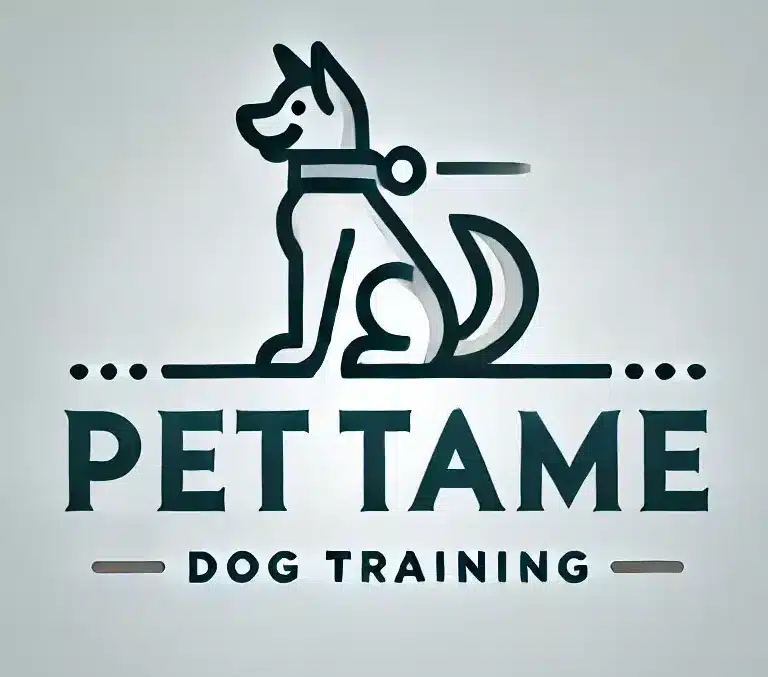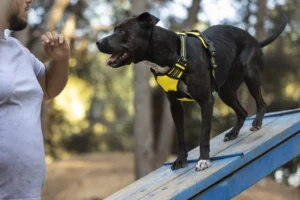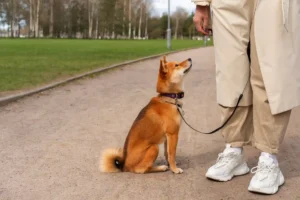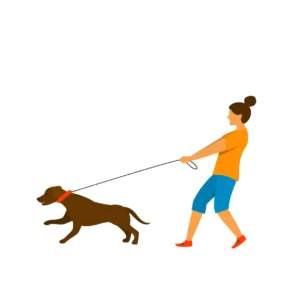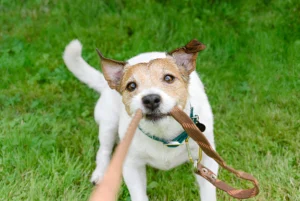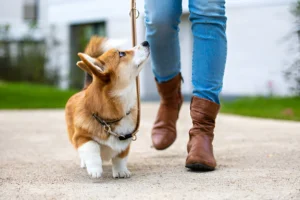Why Does My Dog Bark at Other Dogs on Walks? Tips to Keep Them Calm
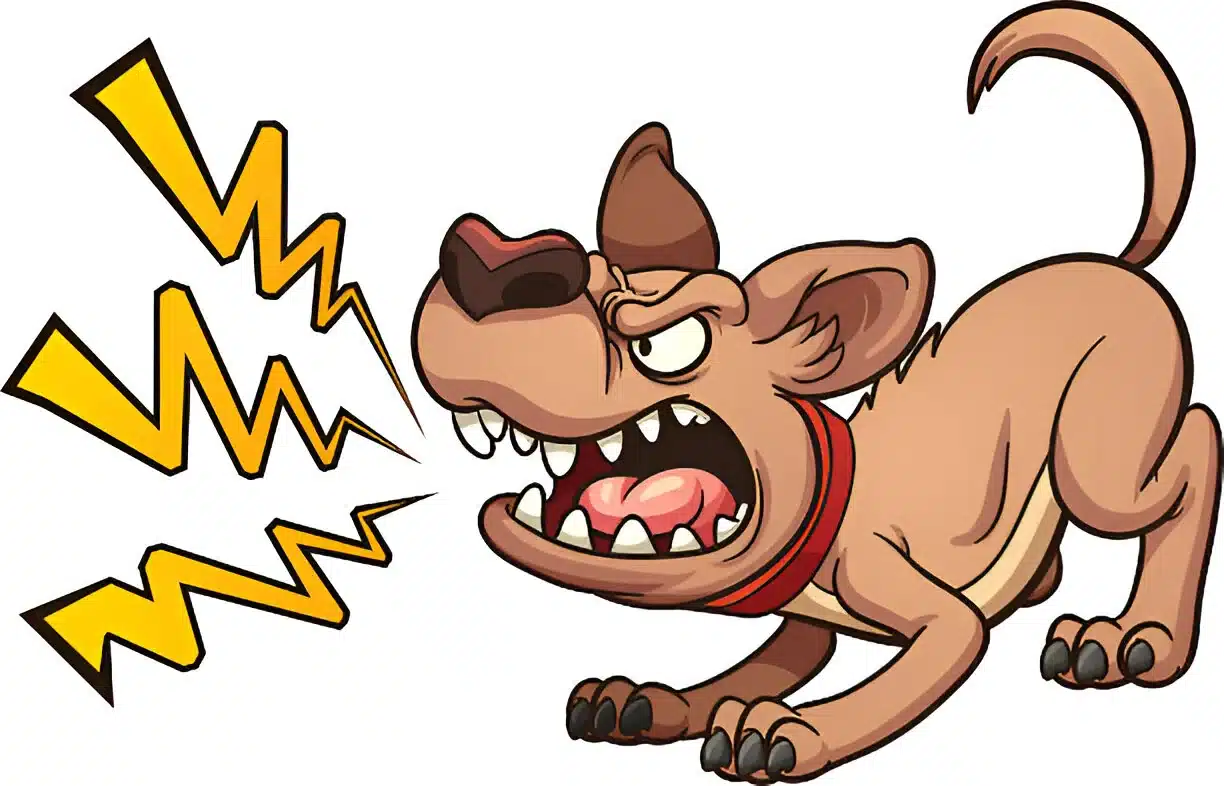
Many dog owners struggle with their dog barking at other dogs on walks. You might wonder, “Why does my dog bark at other dogs?” Understanding why your dog barks at other dogs is key to helping them. This guide will explore why dogs bark at other dogs and provide practical tips for calmer walks.
Why Does My Dog Bark at Other Dogs? Understanding Dog Reactivity
Dog reactivity means an excessive or unsuitable reaction to normal things. Lunging, growling, barking, or snapping at people, animals, or objects like bikes or cars can happen. Reactivity often shows your dog feels anxious or frustrated. Past experiences can make the behavior stronger.
Many owners ask, “Why does my dog bark at other dogs?” The answer is complex.
What Causes My Dog to Bark at Other Dogs? Fear, Frustration, and More
Fear and frustration are the main reasons dogs bark at other dogs. These feelings can occur together. It can be hard to tell the difference, as every dog reacts differently. “Why does my dog bark at other dogs?” is a question that often requires expert insight. A certified professional dog trainer or animal behaviorist can give you personalized help.
Want to learn more about understanding and managing your dog’s barking behavior? Check out our comprehensive guide to how to train your dog not to bark for more in-depth information and training tips.
Fear: A Key Reason Why Your Dog Barks at Other Dogs
Fearful dogs might seem confident or aggressive. This can lead to mislabelling their behavior as dominance. It is important to recognize and address fear-based reactivity early.
A fearful dog might try to escape or avoid other dogs.
Think about your dog’s past. Did they have bad experiences with other dogs? Limited positive socialization as a puppy can also play a role. These experiences can explain why your dog barks at other dogs.
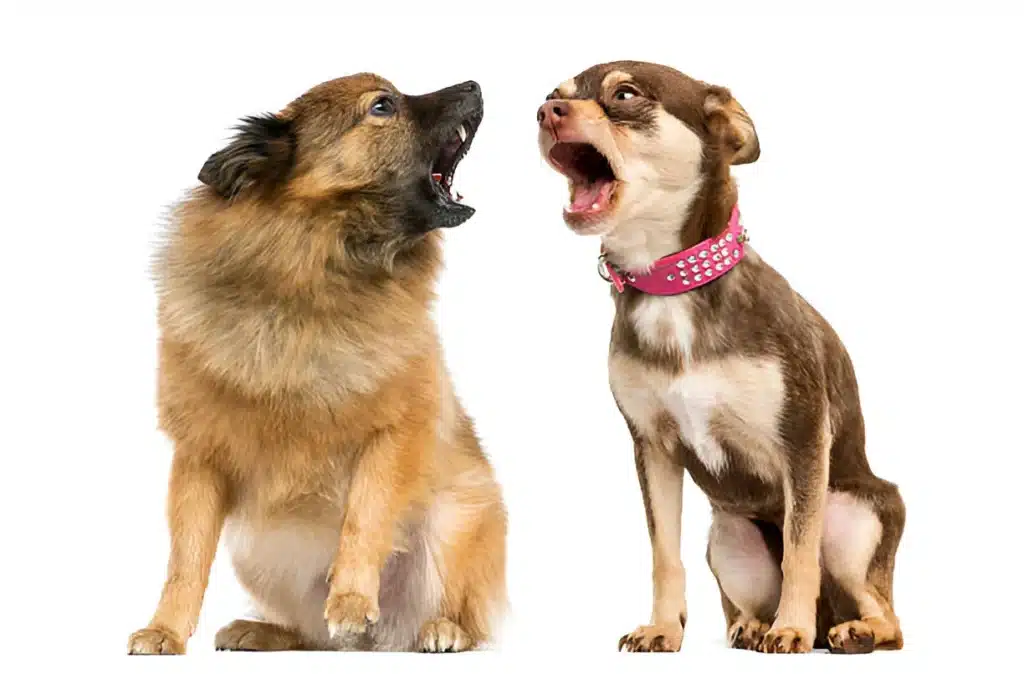
Emotional Discord: The Complexities of Why Your Dog Barks at Other Dogs
Many reactive dogs feel several emotions at once. Fear, often from bad past experiences or not enough socialization, can be a factor. Frustration develops when dogs want to interact but lack the skills or chances to do it right. This emotional mix fuels reactive barking. You need to address both the fear and the frustration when considering why your dog barks at other dogs.
Frustration: Another Factor in Why Your Dog Barks at Other Dogs
Frustration can cause lunging, barking, and even snapping when other dogs get too close. Dogs mainly driven by frustration might have good interactions with other dogs if they have chances for social interaction and their needs are met.
Limited freedom or choices can make frustration much worse and cause reactive behaviors. A dog on a leash, for example, might get frustrated because they cannot go say hello to another dog, leading to barking and lunging.
Understanding this frustration is key to understanding why your dog barks at other dogs.
Rovers that React: Why Some Dogs Bark at Other Dogs
Some dogs bark to keep other dogs away. This often happens in dogs who were not socialized well or who have had bad experiences with other dogs. They might be saying, “Stay away from me!” This defensive barking is another reason why your dog barks at other dogs.
Adverse Correlates: Why Not to Punish Your Dog’s Barking
Dogs make strong connections, both good and bad. Using aversive training, like punishment, can create fear and anxiety, making reactivity worse. These methods can backfire, increasing fear, anxiety, and damaging your relationship with your dog.
Punishment often makes the problem worse, as the dog becomes even more fearful and reactive. This is why you should not punish your dog for barking at other dogs.
Why Do Dogs Bark at Other Dogs?
Dogs bark at other dogs for a complex mix of reasons, often rooted in fear, frustration, territoriality, or a combination of these. Fearful dogs may bark defensively if they feel threatened or insecure, perhaps due to past negative experiences or a lack of socialization.
They might misinterpret another dog’s body language or feel overwhelmed by the encounter. Frustration can also be a powerful motivator. A dog on a leash, restricted from approaching another dog, might bark out of pent-up energy and a desire to interact. Territoriality plays a role too, as dogs may bark to protect their perceived space, whether it’s their home, yard, or even their usual walking route.
The context of the interaction is important. Whether the dogs are on or off leash, the distance between them, and the other dog’s behavior all influence the likelihood of barking. Ultimately, understanding why a specific dogs barking requires careful observation of their body language, consideration of their history, and awareness of the surrounding environment.
How to Prevent Barking at Other Dogs on Walks
Preventing your dog from barking at other dogs during walks requires a multi-faceted approach. It involves managing their environment, employing effective training techniques, and understanding their emotional state. Here are some specific strategies you can use to address why does my dog bark at other dogs:

Work Below Threshold:
The “threshold” is when your dog goes from calm to reactive (barking, lunging). When a dog is over threshold, they are likely overwhelmed by other dogs. Increasing the distance between your dog and other dogs can lower their threshold. This helps them feel less overwhelmed and calmer, making them more responsive to you. This is a key part of addressing why your dog barks at other dogs.
For Resource Guarding:
If your dog is protective of you (resource guarding), you can try “Otello.” Give your dog treats when another dog comes near. When the other dog leaves, stop giving treats. This can help your dog connect other dogs with good things. This can help with understanding why your dog barks at other dogs when they are resource guarding.
Seek Professional Guidance:
Changing dog behavior needs expertise. Talk to a certified professional dog trainer or animal behaviorist who uses force-free, positive reinforcement methods. They can help you understand why your dog barks at other dogs and create a tailored plan.
For Frustration with Barriers:
Letting your dog meet every dog might seem like a good idea, but it can make their barking worse. Focus on obedience training and give them lots of physical and mental exercise before walks. This addresses the frustration that can contribute to why your dog barks at other dogs.
Reduce Stress:
Lowering your dog’s stress can reduce reactivity. Avoid crowded places and walk when it is less busy. When you see another dog, increase the distance between you and the other dog as much as possible. Avoid high-intensity activities like dog parks, which can increase their stress. A less stressed dog is less likely to bark at other dogs.
Is your dog’s nighttime barking keeping you up at night? Find solutions and learn how to address this common behavior by visiting our comprehensive guide on why is my dog barking at night?
Training Considerations for Dogs Who Bark at Other Dogs
Building trust is very important when working with reactive dogs. Your dog needs to feel safe with you. This means staying far enough away from triggers and slowly increasing exposure as your dog gets more comfortable. Space is also key for managing frustration. It lets your dog handle the situation without feeling overwhelmed. These considerations are crucial when addressing why your dog barks at other dogs.

Training Techniques for Dogs Who Bark at Other Dogs
Effective training is essential for addressing why does my dog bark at other dogs. These techniques focus on changing your dog’s emotional response to other dogs, building their confidence, and teaching them alternative behaviors. Here are some proven methods:
“Let’s Go” Cue:
Teach your dog to move away from the trigger (another dog) when you say a specific word (e.g., “Let’s go”). This helps them stop focusing on the other dog and rely on you.
Eye Contact and Check-ins:
Make eye contact with your dog and reward them for checking in with you. This builds trust and helps them not fixate on other dogs.
Look-at-Me:
Reward your dog for looking at you when they see another dog. This makes them connect other dogs with positive reinforcement.
Scatter-feeding:
Throw treats on the ground to encourage sniffing and distract your dog from the other dog. Sniffing can be calming.
Conclusion: Helping Your Dog Who Barks at Other Dogs
Changing dog reactivity takes patience, understanding, and consistency. By addressing the reasons why your dog barks and using the right training, you can help them handle seeing other dogs better. Every dog is different.
What works for one dog might not work for another. If you have trouble, consult with a certified professional dog trainer or animal behaviorist for personalized help. Understanding why your dog barks at other dogs is the first step to a calmer, happier life together.
Frequently Asked Questions:
This blog post was created with the expertise of our dedicated team at Pet Tame:

Behavioral Therapist

Training Assistant & Support Coordinator
The information provided in this blog post was thoroughly researched to ensure accuracy and offer practical, up-to-date advice for dog owners seeking to understand and manage their dog’s reactivity. We combined insights from trusted sources with the expertise of our team to provide the most reliable guidance on addressing this common concern.
